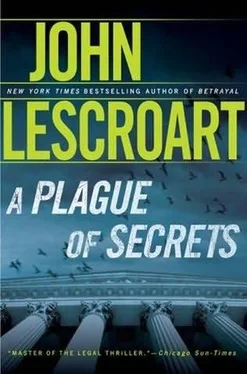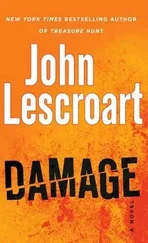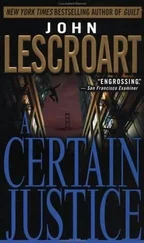“You mean on the theory, Mr. Hardy, that people who have a lot of money don’t want to have more?”
“He doesn’t need to take that kind of risk to get it. He wouldn’t take that risk. Neither would she.”
“Which came first, I wonder, the real estate or the drugs? Mr. Townshend may have a fortune, Mr. Hardy, but we intend to claim every dollar of it that came from the narcotics business. Then we’ll see how much he’s got left.”
“Why would they take the risk?” Hardy repeated.
Glass had a hand stretched out casually in front of him as he scratched at his desk blotter. “One could make the argument, I think you’ll agree, given the, shall we say, personal relationship between your client and the mayor’s office, that there was no risk here in this city in running any kind of illegal operation.” Now he came forward, his eyes narrowing, a hint of real anger ruddying up the pale flesh of his face. His voice, though, remained controlled. “She was paying the man ninety thousand dollars a year, for Christ’s sake.”
“That’s right.”
“To manage a coffee shop.”
“Correct. Last time I checked, that wasn’t a crime.”
“No, but money laundering is. He gives her his dope money, she puts it in her or her husband’s account, and they pay him back out of that.”
“That wasn’t happening,” Hardy said flatly.
“I intend to show that it was. You get people worried about their assets, you’d be surprised what turns up.”
Hardy uncrossed his legs and came forward in his chair. “Mr. Glass, have you met these people? They didn’t do any of this.”
“No? Well, we’ll see. But what’s your point? That I’d like them if I met them socially? That it would matter to me? I’m sure they’re charming. People who deal in cons tend to be.”
“You’ve got this completely wrong,” Hardy said. “You don’t have any facts that implicate my client in any of this. And meanwhile, you’ve got her threatened with this forfeiture. It’s just a blunt instrument at this point.”
“Well.” Glass folded his heavy hands on the desk. “It’ll get us on the road to finding out what we need to know. And sometimes you just have to use the tools you got.”
“You can still do that?” Hardy asked from the office doorway.
“It’s like riding a bicycle,” Art Drysdale replied, “once you’ve got it…” He caught the last of the three baseballs he’d been juggling at his desk, tucked them into one enormous paw and, with a lot more enthusiasm than Jerry Glass had evinced, sprang up from his chair to shake Hardy’s hand. “But, hey, you’re looking great. How you doin’?”
“Any better and they’d have to change my medication,” Hardy said. He cast a quick eye around the premises, which sported a lot more personality than Jerry Glass’s digs. Of course, that might have been because Drysdale himself had a lot more personality than his gung-ho new colleague. Drysdale-no relationship to the ex-Dodger Don-had been a professional baseball player in his youth, making it up to the Giants for a cup of coffee in the mid-sixties, before deciding to go into the law. The bookshelf that covered his left-hand wall was packed with sports memorabilia, trophies from the PAL coaching days, photos with the great-McCovey, Cepeda, Mays!-and with his family, four boys, himself, and even his wife usually attired in some kind of sports uniform.
“If I hadn’t just come from Jerry Glass,” Hardy added, “I might even be positively glowing.”
Drysdale boosted himself back up onto his desk, motioned that Hardy might want to get the door behind him. When that was done, Drysdale clicked his tongue. “Mr. Glass didn’t give you much satisfaction, did he?”
“Oh, no. To the contrary, he was nothing if not informative. The problem was that the information sucked. You guys can really just take property?”
Drysdale grimaced. “We’re the federal government, Diz. We can do anything we want. Why? Because who’s going to stop us?” Then, in a different tone, “I admit, it’s a bit of problem for some of us. On both sides. That little, tiny potential for abuse of the system, since if you play it close enough, you don’t really get seriously called on anything.”
“And that’s what Glass is doing? Playing it close?”
A nod. “From what I hear, he’s pretty much on his game, let’s say that.”
“So what do I do?”
“What do you mean?”
“I mean, I’ve got a client involved here, Art. In theory I’m supposed to keep her and maybe even her family out of this trouble.”
Drysdale let out a dry chuckle. “Well, there’s your problem. The system’s kind of set up to keep you out of it. Especially if he’s using the grand jury, which I happen to know he is.”
“Yeah. He told me that too.”
“Okay. So you’ll never find out what happens there. Don’t even try, Diz. No lawyers allowed. No witnesses. No talking about anything said there, ever ever. But you know this.”
“Okay, but how’s he do the forfeiture?”
“Well, actually, that’s pretty slick. He’s only asking for a civil forfeiture.”
“As opposed to criminal, I presume. But what does that mean?”
“It means, basically, that he posts the property… you know anything about this at all?”
“Not really. It doesn’t come up every day.”
“No. I’d guess not. Which is why Glass can have so much fun with it. Just for starters, you want to guess what the forfeiture rules are administered under?”
“The Little League?”
Drysdale cracked a smile. “Closer than you’d think, actually. The Rules of Admiralty.”
“That was my second guess.”
“I’ll give you partial credit, then. And you know why it was Admiralty rules? Because since Elizabethan times, the British Empire allowed an action against a ship as a way of getting at the owner. They would literally ‘arrest’ the thing, the ship, before it took off, and make the owners in some faraway country post a bond before they would release the ship back to the high seas. Then they could collect whatever was owed from the bond. In rem jurisdiction. Latin for ‘against the thing.’ Just like here. Grab the store. Make the owners come to court to free it in a civil case. So basically, your clients are going to have to sue to get their shop out of this limbo, and, surprise, the burden of proof is now on them. The good news is that they get to stay in business-their legitimate business-until the final ruling.”
Hardy walked over and settled himself into a rocking chair in the corner by the bookshelf. “So what’s the point? What’s it get Glass to just post the place?”
“Not much, if that’s all he’s doing. He might win, he might not. But either way, he gets their attention.”
“So what?”
“Aha!” Drysdale held up a finger. “ ‘So what’ is that he’s allowed to talk about a civil case. To the newspapers, TV, to your clients, to the cops, to anybody. He’s doing the public a service by talking about it. Meanwhile, he’s stirring the pot to see what rises.”
“But as opposed to what?”
“I’d tell you, but I know you already know.”
Hardy paused, and of course the obvious truth emerged. “The grand jury.”
“Ta da!” Drysdale spread his hands in a victory gesture. “Two prongs. One public, one secret.” His face went dark. “It is a serious, no-bullshit press, Diz. And my sources tell me that old Jerry is playing it so far like a maestro. You know, he got his homicide inspector-Schiff, is it?-designated as a special agent of the grand jury?”
“He can do that?”
Drysdale tsked. “I believe we’ve mentioned that he can do anything, haven’t we? He can get the grand jury to designate anybody as its agent. And what does that agent have access to? Grand jury documents, including financial and bank records, which, by the way, in real life the feds-us-can subpoena anytime and the state can never ever get its hands on.” Drysdale turned a hand over. “Now, of course, that agent can’t reveal what’s in those documents-that’s secret-but she can act on her knowledge of them. Including-you’ll love this-based on this private knowledge, she can argue for a judge to order release of these otherwise secret docs. And also, PS, if that doesn’t work, once the documents leave the grand jury room, sometimes they get leaked somehow. Though that, of course again, would be wrong.”
Читать дальше












